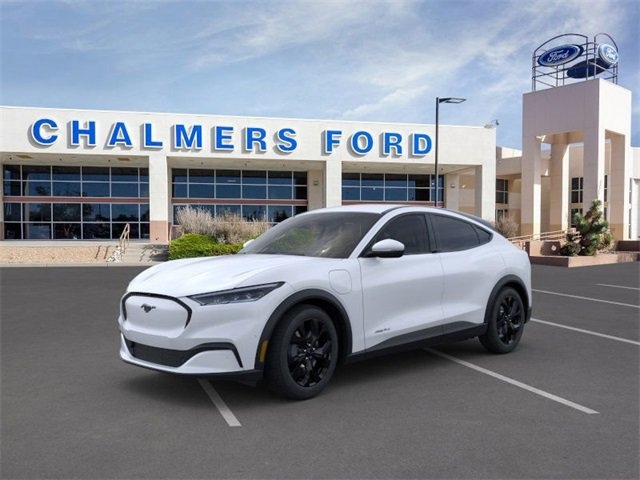Hybrid vs. EV: Which Is Right for You?
As the automotive industry continues to evolve, more and more people are considering alternative fuel vehicles, such as hybrids and electric vehicles (EVs). Both offer benefits in terms of improved fuel efficiency and reduced emissions compared to traditional gas-powered cars. But which one is the right choice for you: a hybrid or an EV? For this article, our team at Chalmers Ford in Rio Rancho, New Mexico, has gathered in-depth information about the pros and cons of each to help you decide.
What are The Benefits of Owning an EV?
Electric cars are powered entirely by electricity stored in rechargeable batteries. When you press the accelerator in an EV, it activates an electric motor that draws power from the battery pack to turn the wheels. That's why EVs produce zero direct emissions, making them an environmentally friendly choice.
Electric cars offer more benefits than traditional gas-powered vehicles. One major advantage is their cost-effectiveness. Charging an EV is more affordable than refueling a gas car since electricity is cheaper than gasoline. Moreover, you can often find discounted charging rates during off-peak times. With fewer moving components compared to gas engines, EVs also incur lower maintenance expenses throughout their life span. Plus, EV owners can benefit from tax incentives, such as the federal tax credit of up to $7,500 for buying a new EV, and various state rebates that can significantly reduce the initial cost of owning an EV.
In addition to cost savings, EVs provide an enhanced driving experience. Electric motors deliver instant torque, ensuring quick and smooth acceleration. The heavy battery packs on the floor lower the vehicle's center of gravity for improved handling. Furthermore, the absence of engine noise results in a quiet and peaceful cabin environment. These factors collectively make EVs an attractive option if you're environmentally conscious and seek a more cost-effective and enjoyable driving experience.
Hybrid Overview and Benefits
Hybrid vehicles feature both a gasoline engine and an electric motor. The electric motor is powered by a small battery pack that gets recharged by capturing energy from braking. At low speeds, hybrids can run on the electric motor for a short distance, typically 1 to 2 miles, after which the gas engine seamlessly takes over once the battery is depleted or when more power is needed.
Hybrids offer improved fuel efficiency by utilizing both electric and gas motors strategically, achieving better mileage in city and highway driving. Despite still burning gasoline, hybrids emit significantly lower levels of emissions compared to traditional vehicles, acting as a transitional option toward full electrification. They provide the convenience of refueling at any gas station, making them suitable for long road trips without the need for charging stations. However, unlike EVs, hybrids don't promise the same cost-saving benefits due to their continued reliance on gasoline.
Should I get an EV or Hybrid?
When deciding between an EV and a hybrid, it's important to consider the driving range. Most EVs today can travel 200-300 miles on a full charge, which is suitable for daily commuting and errands. However, if you frequently take long road trips, an EV may not be practical unless you plan your route around charging stations. Hybrids don't have this limitation since they can run on gasoline when needed.
Access to charging infrastructure is another crucial factor. To charge an EV at home, you'll need to install a 240-volt Level 2 charging station, which costs several hundred dollars. While public charging stations are becoming more common, they're still not as widespread as gas stations. You can refuel hybrids anywhere, making them more convenient for some lifestyles.
Maintenance is another important aspect to think about. Electric cars have fewer moving parts than gas-powered ones, resulting in lower maintenance costs. There's no need for oil changes, and regenerative braking means brake pads last longer. However, EVs may require a costly battery replacement after 10 years. Hybrids are more complex than gas-only cars and may have higher maintenance costs. It's essential to research the reliability and maintenance records of any model you're considering.
The Future of Electric and Hybrid Vehicles
Electric cars and hybrids are gaining popularity as automakers heavily invest in these technologies. Battery advancements are improving driving ranges and decreasing costs for EVs, with projections suggesting that they'll soon be cost-competitive with gas-powered cars. The expansion of charging infrastructure, including over 40,000 public EV charging stations in the U.S., is further boosting adoption. Government policies, such as federal EV tax credits and state objectives to phase out gas-powered cars, are speeding up the transition to electrification. This shift is crucial for reducing carbon emissions and air pollution, as transportation is a major contributor to climate change.
Explore Our EV and Hybrid Inventory at Chalmers Ford
If you're interested in switching to an electric or hybrid vehicle, our team at Chalmers Ford is here to help. We offer a wide range of electric vehicles, such as the Ford Mustang Mach-E and Ford Escape Plug-In Hybrid, with specials and incentives available. You can explore our inventory online or in person. Our knowledgeable sales staff is ready to help you find the perfect EV or hybrid to meet your specific needs and budget. We can also arrange test drives to experience the unique features of these vehicles. Don't wait any longer — contact us today.
